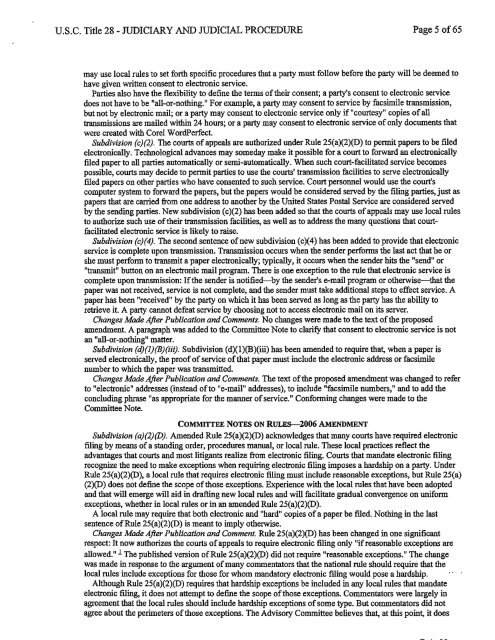Bausch and Lomb_Opposition_2_RamirezWritofCert_2017-03-14
Create successful ePaper yourself
Turn your PDF publications into a flip-book with our unique Google optimized e-Paper software.
U.S.C. Title 28- JUDICIARY AND JUDICIAL PROCEDURE P a g e 5 of 65<br />
may use local rules to set forth specific procedures that a party must follow before the party will be deemed to<br />
have given written consent to electronic service.<br />
Parties also have the flexibility to define the terms of their consent; a party's consent to electronic service<br />
does not have to be "all-or-nothing." For example, a party may consent to service by facsimile transmission,<br />
but not by electronic mail; or a party may consent to electronic service only if "courtesy" copies of all<br />
transmissions are mailed within 24 hours; or a party may consent to electronic service of only documents that<br />
were created with Corel WordPerfect.<br />
Subdivision (c)(2). The courts of appeals are authorized under Rule 25(a)(2)(D) to permit papers to be filed<br />
electronically. Technological advances may someday make it possible for a court to forward an electronically<br />
filed paper to all parties automatically or semi-automatically. When such court-facilitated service becomes<br />
possible, courts may decide to permit parties to use the courts' transmission facilities to serve electronically<br />
filed papers on other parties who have consented to such service. Court personnel would use the court's<br />
computer system to forward the papers, but the papers would be considered served by the filing parties, just as<br />
papers that are carried from one address to another by the United States Postal Service are considered served<br />
by the sending parties. New subdivision (c)(2) has been added so that the courts of appeals may use local rules<br />
to authorize such use of their transmission facilities, as well as to address the many questions that courtfacilitated<br />
electronic service is likely to raise.<br />
Subdivision (c)(4). The second sentence of new subdivision (c)(4) has been added to provide that electronic<br />
service is complete upon transmission. Transmission occurs when the sender performs the last act that he or<br />
she must perform to transmit a paper electronically; typically, it occurs when the sender hits the "send" or<br />
"transmit" button on an electronic mail program. There is one exception to the rule that electronic service is<br />
complete upon transmission: If the sender is notified—by the sender's e-mail program or otherwise—that the<br />
paper was not received, service is not complete, <strong>and</strong> the sender must take additional steps to effect service. A<br />
paper has been "received" by the party on which it has been served as long as the party has the ability to<br />
retrieve it. A party cannot defeat service by choosing not to access electronic mail on its server.<br />
Changes Made After Publication <strong>and</strong> Comments. No changes were made to the text of the proposed<br />
amendment. A paragraph was added to the Committee Note to clarify that consent to electronic service is not<br />
an "all-or-nothing" matter.<br />
Subdivision (d)(1)(B)(iii). Subdivision (d)(1)(B)(iii) has been amended to require that, when a paper is<br />
served electronically, the proof of service of that paper must include the electronic address or facsimile<br />
number to which the paper was transmitted.<br />
Changes Made After Publication <strong>and</strong> Comments. The text of the proposed amendment was changed to refer<br />
to "electronic" addresses (instead of to "e-mail" addresses), to include "facsimile numbers," <strong>and</strong> to add the<br />
concluding phrase "as appropriate for the manner of service." Conforming changes were made to the<br />
Committee Note.<br />
COMMITTEE NOTES ON RULES-2006 AMENDMENT<br />
Subdivision (a)(2)(D). Amended Rule 25(a)(2)(D) acknowledges that many courts have required electronic<br />
filing by means of a st<strong>and</strong>ing order, procedures manual, or local rule. These local practices reflect the<br />
advantages that courts <strong>and</strong> most litigant realize from electronic filing. Courts that m<strong>and</strong>ate electronic filing<br />
recognize the need to make exceptions when requiring electronic filing imposes a hardship on a party. Under<br />
Rule 25(a)(2)(D), a local rule that requires electronic filing must include reasonable exceptions, but Rule 25(a)<br />
(2)(D) does not define the scope of those exceptions. Experience with the local rules that have been adopted<br />
<strong>and</strong> that will emerge will aid in drafting new local rules <strong>and</strong> will facilitate gradual convergence on uniform<br />
exceptions, whether in local rules or in an amended Rule 25(a)(2)(D).<br />
A local rule may require that both electronic <strong>and</strong> "hard" copies of a paper be filed. Nothing in the last<br />
sentence of Rule 25(a)(2)(D) is meant to imply otherwise.<br />
Changes Made After Publication <strong>and</strong> Comment. Rule 25(a)(2)(D) has been changed in one significant<br />
respect: It now authorizes the courts of appeals to require electronic filing only "if reasonable exceptions are<br />
allowed." i The published version of Rule 25(a)(2)(D) did not require "reasonable exceptions." The change<br />
was made in response to the argument of many commentators that the national rule should require that the<br />
local rules include exceptions for those for whom m<strong>and</strong>atory electronic filing would pose a hardship.<br />
Although Rule 25(a)(2)(D) requires that hardship exceptions be included in any local rules that m<strong>and</strong>ate<br />
electronic filing, it does not attempt to define the scope of those exceptions. Commentators were largely in<br />
agreement that the local rules should include hardship exceptions of some type. But commentators did not<br />
wee about the perimeters of those exceptions. The Advisory Committee believes that, at this point, it does

















